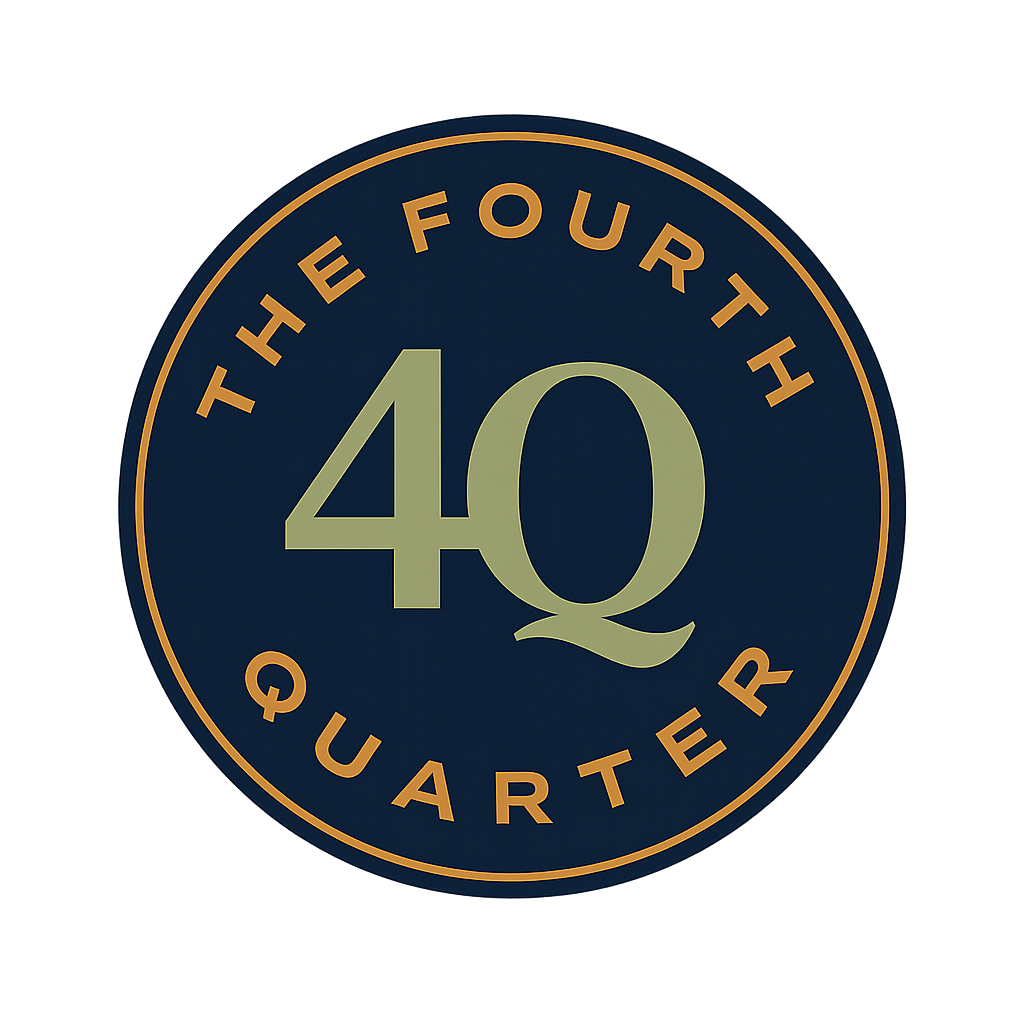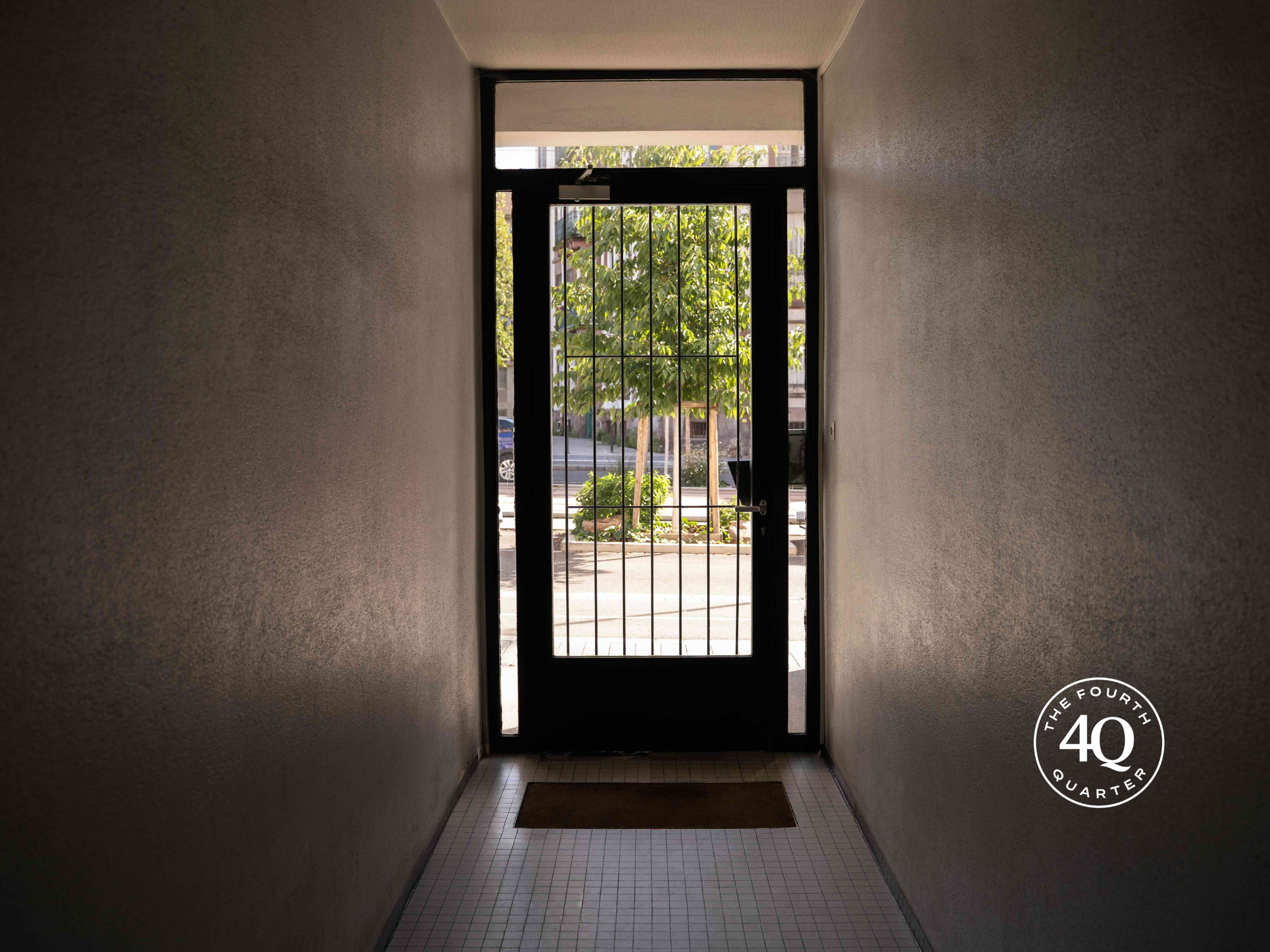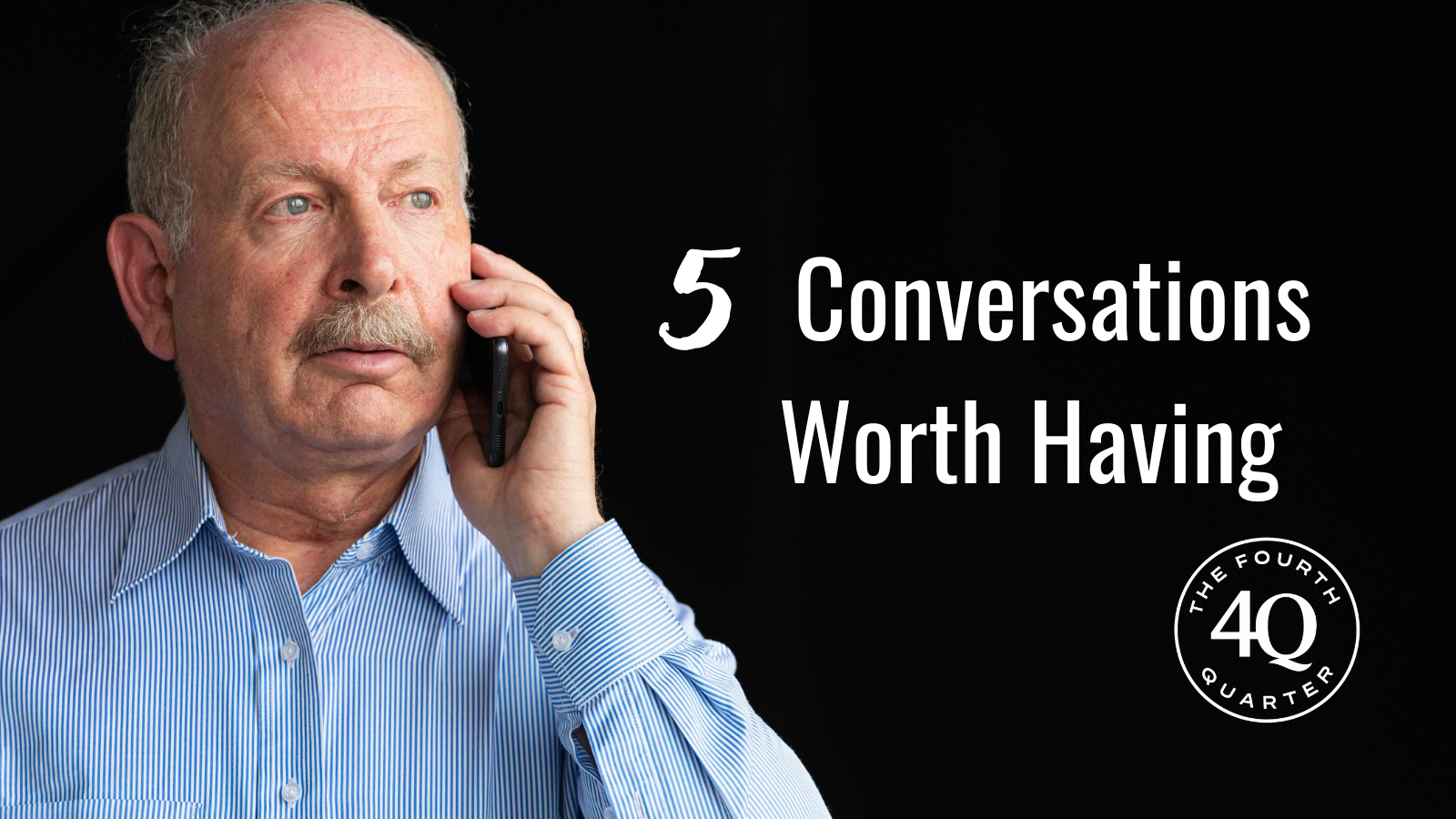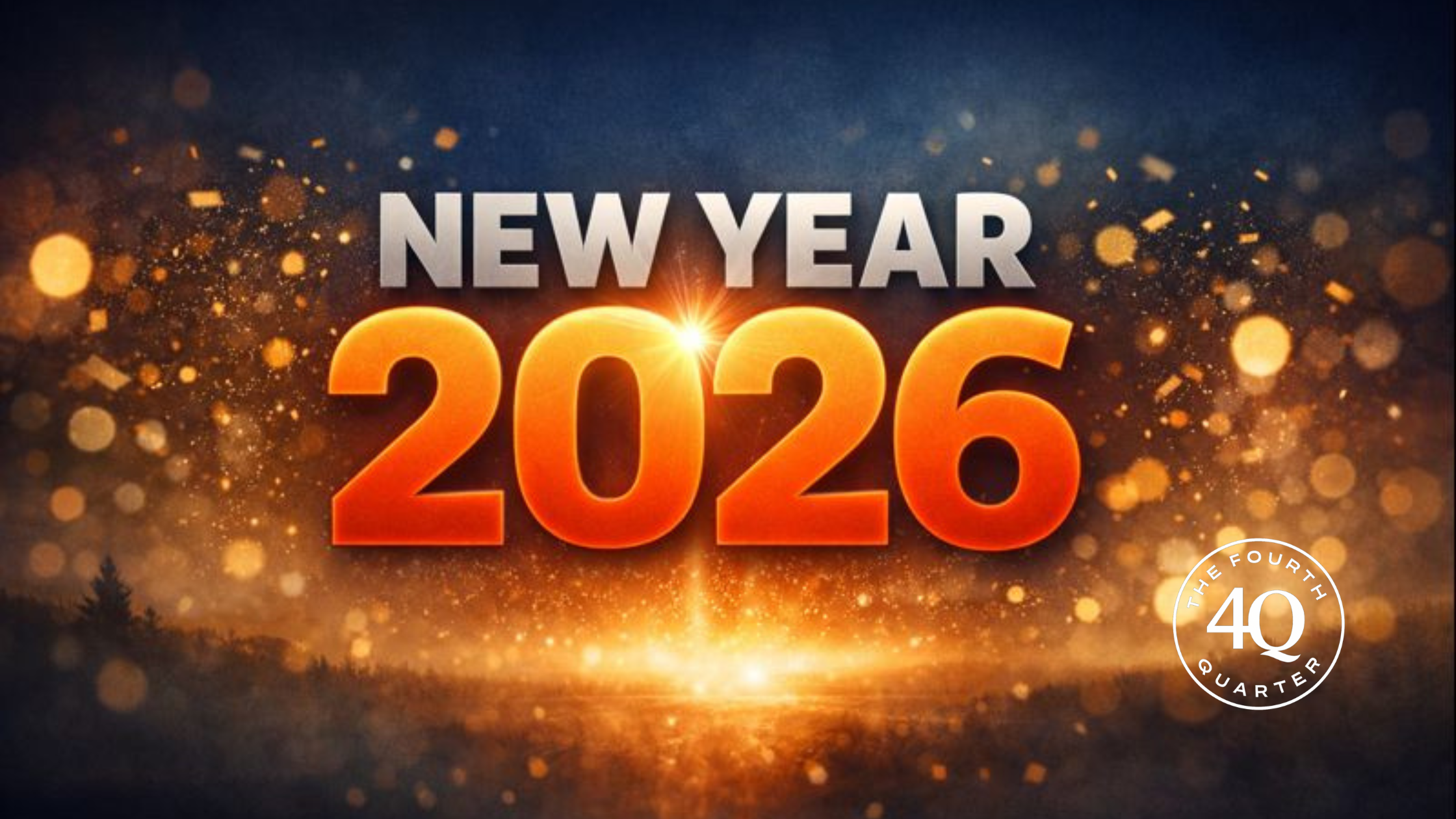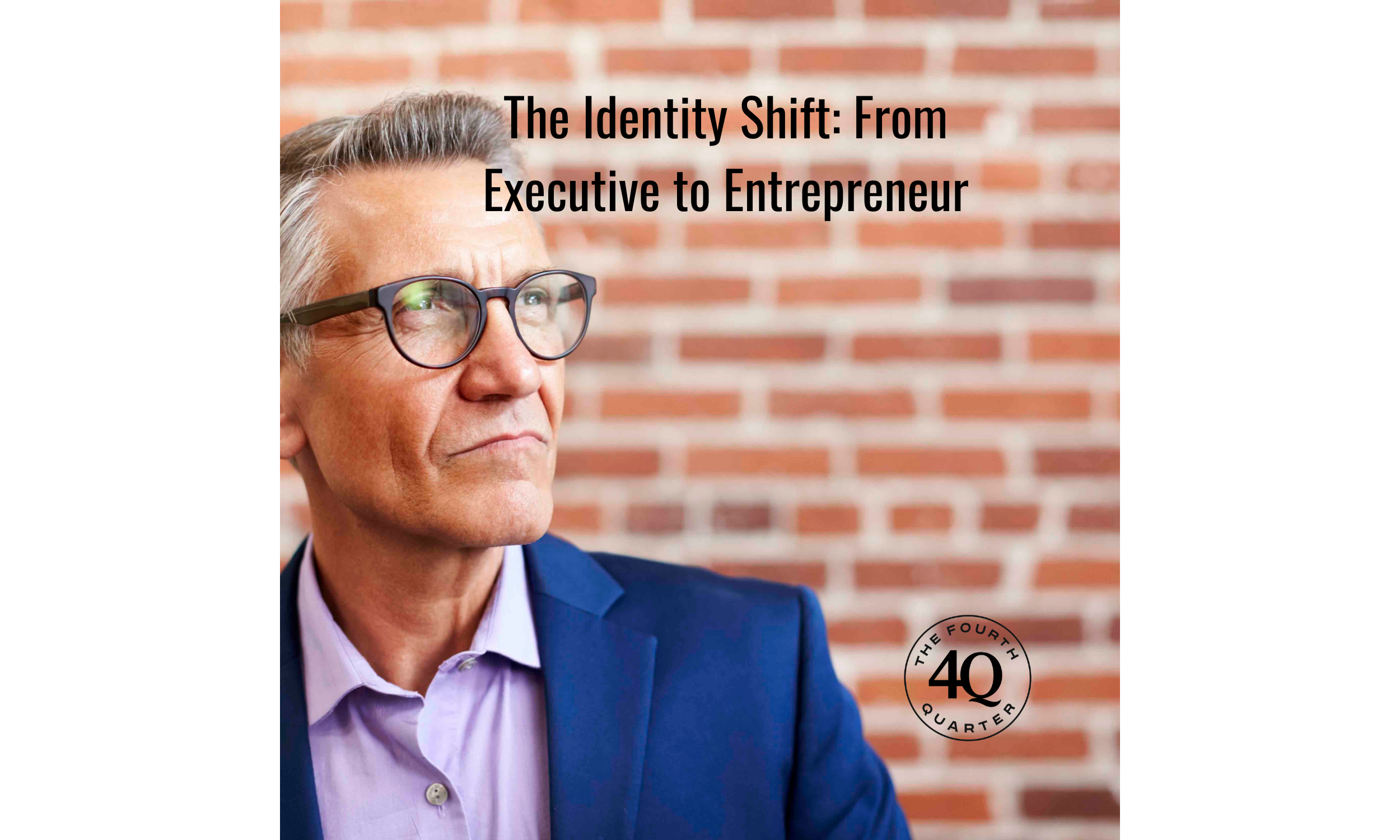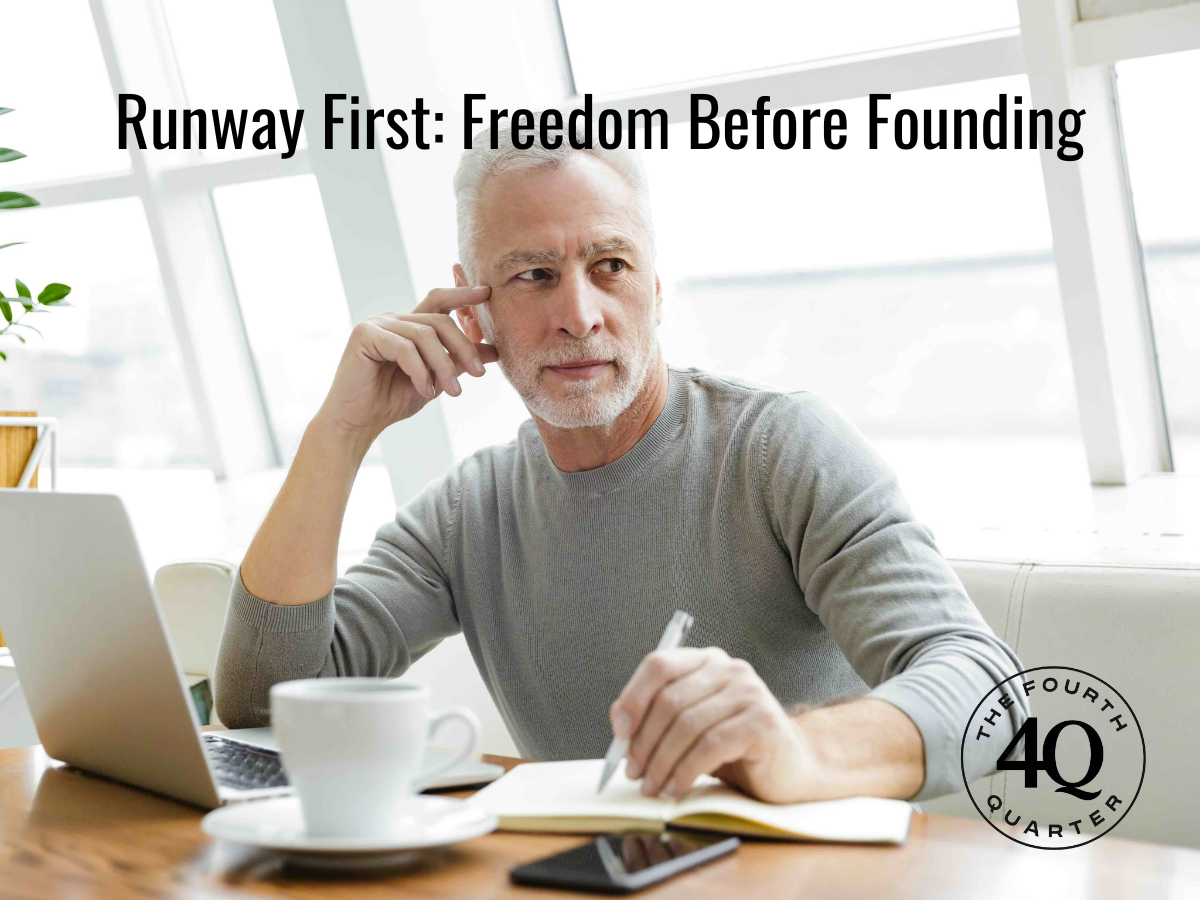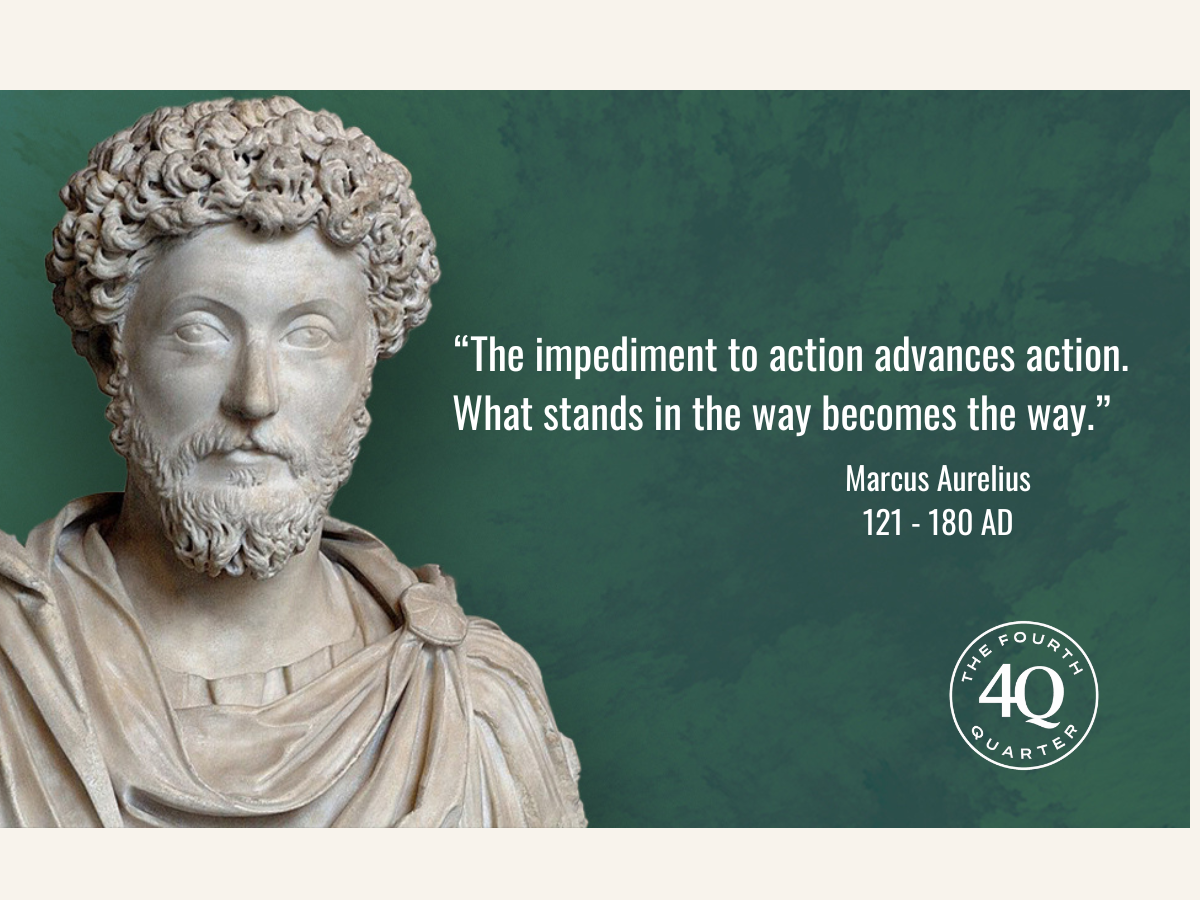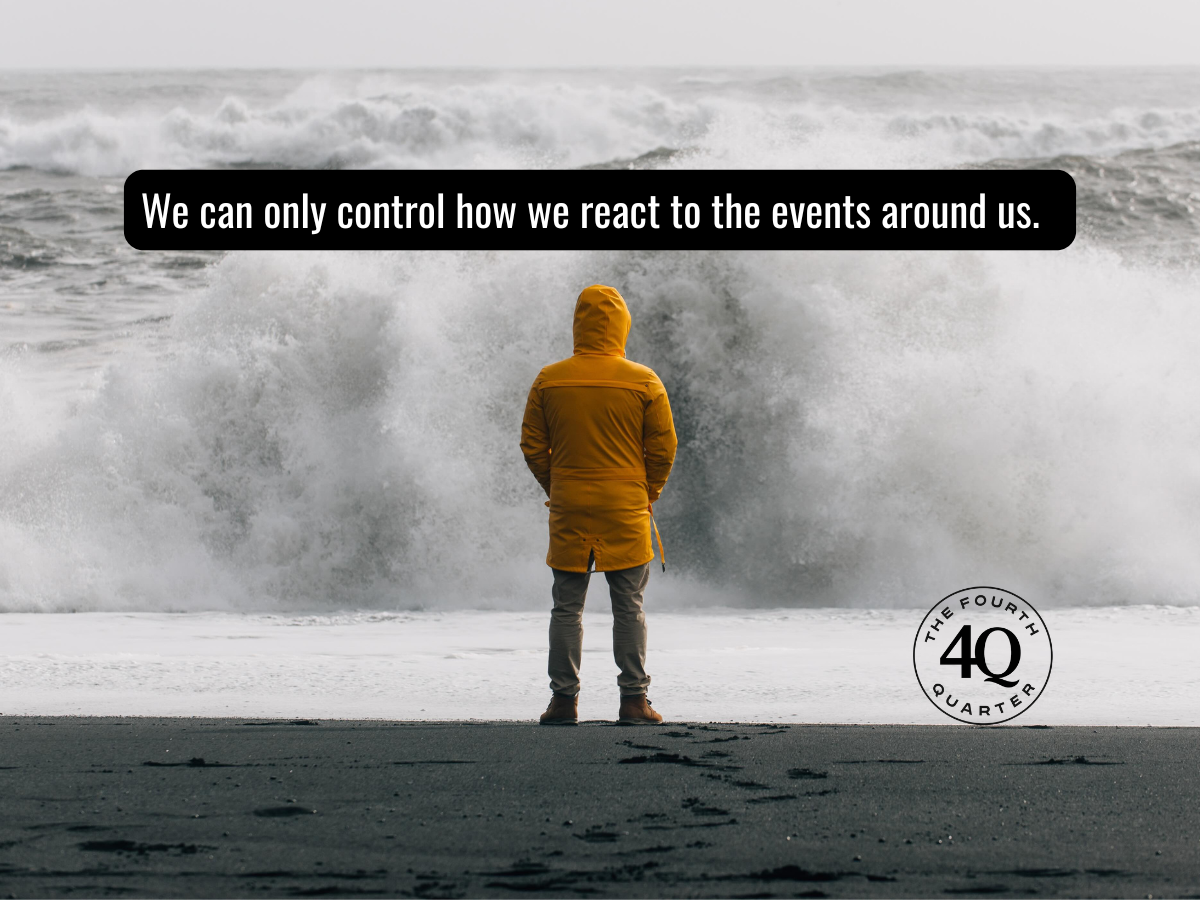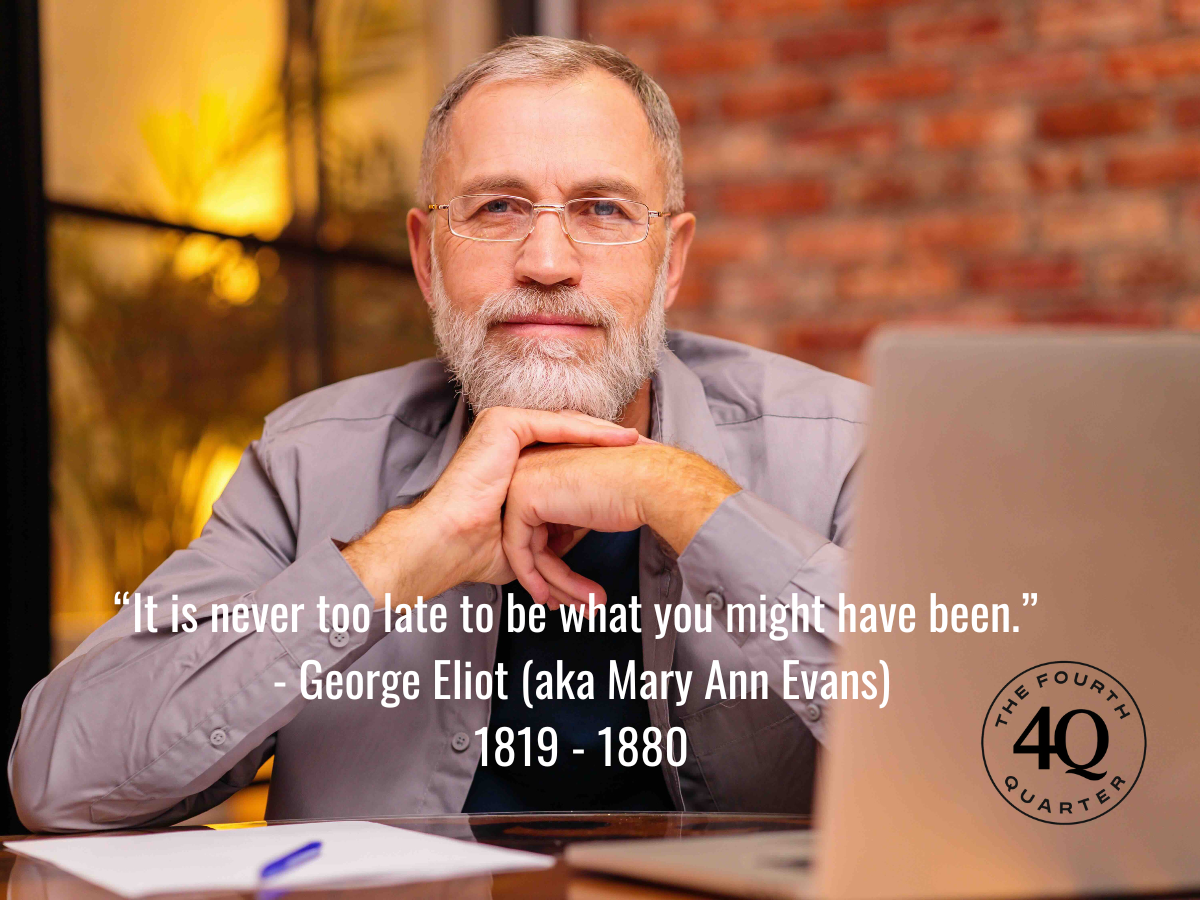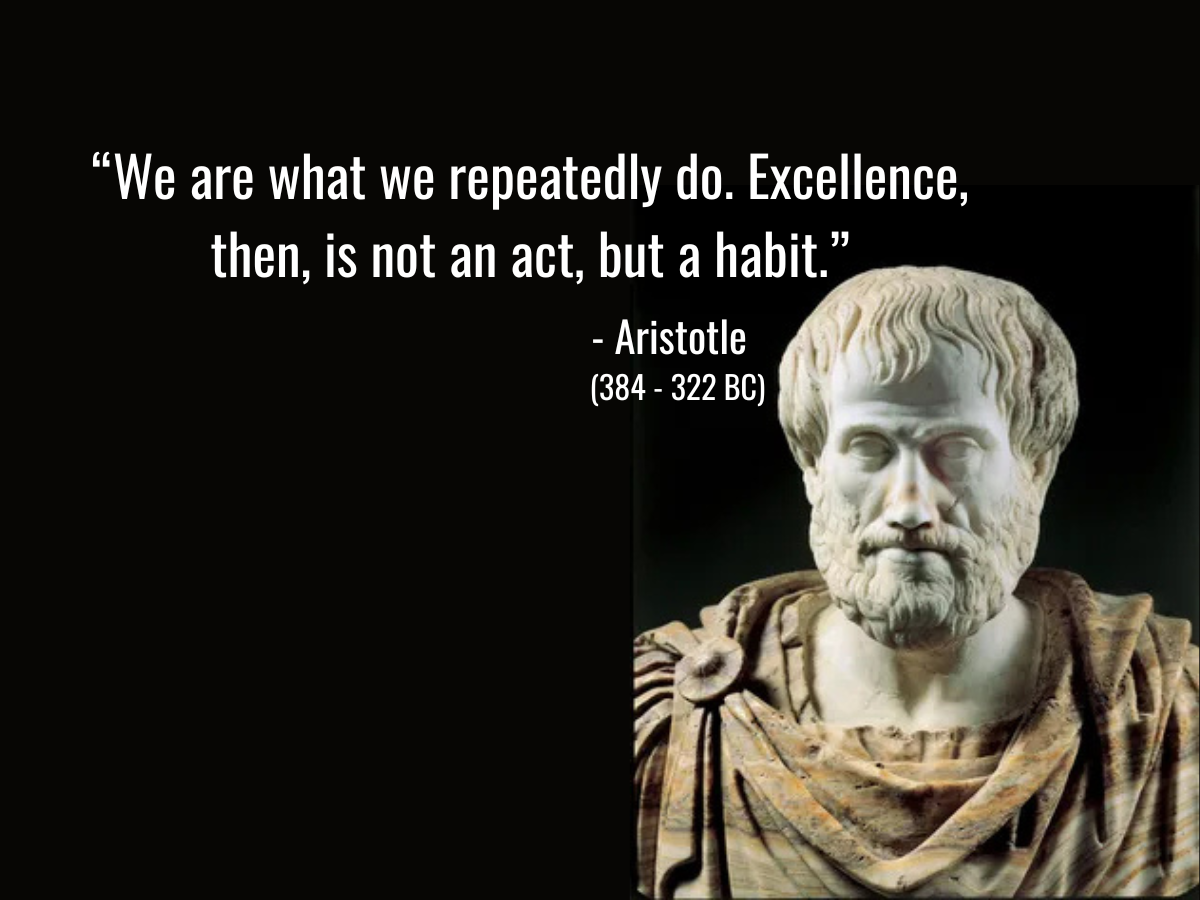What Will It Take?
Waiting feels responsible in the 4th Quarter. That’s why it’s so dangerous.
Optionality doesn’t disappear overnight. It erodes quietly. Your health, confidence, networks, relevance, etc. until one day you realize waiting didn’t protect you. It narrowed your options.
Waiting feels responsible in the 4th Quarter.
That’s why it’s so dangerous.
By this point in your life, you’ve learned patience.
You’ve learned restraint.
You’ve learned that not every impulse deserves action.
That’s a strength… Until it isn’t.
Because somewhere along the way, patience quietly starts to masquerade as wisdom. And wisdom becomes the excuse.
“I’m just being thoughtful.”
“I’m not rushing into anything.”
“I’ll make the move when the timing is better.”
Nothing about those statements is obviously wrong.
That’s the problem.
Most people don’t fail to change because they’re reckless or unmotivated.
They fail because nothing is broken enough, yet.
Life is comfortable. Work is tolerable. Health is good. The downside isn’t screaming.
So they wait.
Here’s the uncomfortable truth about the 4th Quarter:
Our optionality shrinks quietly.
Not all at once. Not dramatically. It doesn’t collapse.
It erodes.
Your health doesn’t vanish. It just stops bouncing back as fast.
Your confidence doesn’t disappear. It hesitates longer than it used to.
Your network doesn’t evaporate. It slowly stops opening new doors.
Your relevance doesn’t end. It just takes more effort to maintain.
None of this triggers an alarm.
There’s no moment where someone taps you on the shoulder and says, “That window just closed.”
It simply gets harder to open the same doors that once swung easily.
And so you tell yourself you’re being patient.
But patience only makes sense when something is compounding in your favor.
In the 4th Quarter, the opposite is often true.
Energy doesn’t renew the way it once did.
Not motivation.
Actual energy. Physical, cognitive, emotional.
You still have plenty. But you don’t have unlimited retries.
Optionality works the same way.
The longer you wait to act, the more conditions you quietly add:
I’ll do it when I feel more confident
I’ll do it when things calm down
I’ll do it when I have more certainty
But certainty doesn’t arrive. It never has.
What does arrive is inertia.
And inertia feels safe because it looks like stability. Until one day it doesn’t.
The risk in your 30s was failure.
The risk in your 50s and 60s is regret.
Not dramatic regret. Not the movie-version.
The quiet kind.
The kind that shows up when you realize you tolerated something for too long.
When you recognize you stayed because it was easier than deciding.
When you finally admit that waiting didn’t protect you. It just narrowed your options.
The lie we tell ourselves is that waiting keeps doors open.
It doesn’t.
It keeps you standing in the hallway, convincing yourself you’ll choose later.
The 4th Quarter isn’t about urgency or panic.
It’s about honesty.
Honesty about what’s changing.
Honesty about what’s no longer expanding.
Honesty about what you’re calling patience.
So I’ll ask you the question that matters.
What will it take before you stop needing permission?
No answer required.
Just don’t lie to yourself.
The Risk Isn’t Failure. It’s Being Defined by an Old Version of Yourself.
The real risk in the 4th Quarter isn’t failure. It’s being defined by an old version of yourself. Staying relevant is about expansion, not reinvention.
Most professionals don’t talk about this openly, but they feel it.
Not fear of losing everything.
Not fear of starting over.
A quieter fear: Am I still relevant?
Not in a desperate, trend-chasing way, but in a deeper sense.
Does how the world knows me still reflect who I am, and what I can contribute, now?
This isn’t a new tension, but it becomes sharper later in life.
Early in your career, relevance is assumed. You’re learning, growing, moving.
Over time, success can quietly harden into identity. Titles stick. Stories repeat. Old wins become shorthand.
And if you’re not careful, the world keeps meeting you where you once were… not where you are today.
I saw a video on Instagram on the weekend that I believe captured this perfectly.
https://www.instagram.com/reels/DMVNN_YR6QK/
Two artists who broke out at the same time in the early 1990s.
Both were wildly successful.
Both were recognizable around the world.
One became known for far more than his first chapter.
Music, yes!
But also TV, movies, businesses, investing, children’s content, lifestyle content and reinvention across generations.
For thirty years, different people knew him for different things, depending on when and where they saw him.
The other built a solid life and career, but remains publicly defined by a single early hit.
Nostalgia became his brand.
The first chapter never expanded.
This isn’t a story about talent or money or celebrity.
It’s a story about outlook and a vision of how they saw the world.
One stayed curious and expansive.
The other stayed anchored to what once worked.
That same dynamic plays out quietly in professional life every day.
Staying relevant isn’t about chasing trends or reinventing yourself every few years.
In fact, the idea of “reinvention” often creates unnecessary pressure.
It suggests you must reject who you were to become something new.
In the 4th Quarter, relevance is better understood as expansion.
You don’t abandon your experience.
You build on it.
You allow the story to continue.
Expansion means letting the world know you for more than one chapter.
It means staying engaged with what matters now, even as you bring decades of perspective to the table.
It means refusing to be trapped by your own résumé.
This doesn’t require urgency or panic.
It requires intention.
Staying relevant might look like learning selectively instead of broadly.
Applying hard-earned judgment to new problems.
Sharing an insight, not just history.
Being curious about emerging conversations without needing to master everything.
It’s not about keeping up.
It’s about staying in the game.
The real risk in the 4th Quarter isn’t that you slow down or shift focus.
It’s that you stop expanding how you contribute.
Relevance doesn’t disappear overnight. It fades quietly when curiosity gives way to comfort and identity becomes fixed.
You don’t need to chase youth, trends, or attention.
You don’t need to become someone else.
But you do need to stay connected to the present, to how value is created, where conversations are happening, and how your experience can still be useful.
The goal isn’t to be famous or flashy.
It’s to remain engaged, adaptable, and alive to what’s next.
In the 4th Quarter, relevance isn’t about proving you still have it.
It’s about continuing to add chapters on your own terms.
Five Conversations Worth Having Before You Decide What’s Next
Five conversations that can help you gain clarity before deciding what comes next in your 4th Quarter.
When people reach the later stages of their career, the pressure to “figure it out” quietly increases.
What’s next?
What still fits?
What’s worth building now?
The instinct is to retreat inward.
To think harder.
To plan alone.
That’s rarely where clarity comes from.
In the 4th Quarter, some of the most important decisions aren’t made at a desk.
They’re shaped through conversation with people who already know you, understand your context, and aren’t impressed by titles or resumes. Before you commit to a new role, venture, or direction, consider having these five conversations.
Not to get answers, but to gain more perspective
1. The Person Who’s Seen You at Your Best
This is someone who worked closely with you during a strong chapter. They’ve seen how you lead, decide, and handle pressure.
Ask them what they remember you being good at.
Not what you should do, but what they saw you do well.
Patterns tend to surface quickly.
2. The Mentor Who Asks Better Questions Than You Do
Good mentors don’t give instructions. They slow you down.
Reconnecting with someone who’s challenged your thinking before can help you separate genuine desire from temporary restlessness. These conversations often reveal whether you’re chasing change or meaning.
3. The Peer Who Took a Different Path
This is someone roughly your age who made different choices.
Maybe they stayed. Maybe they left. Maybe they reinvented earlier.
Their story isn’t a template to follow.
Instead, it’s a contrast. And contrast often helps clarify.
4. The Person One Chapter Ahead of You
Someone slightly further down the road. They don’t have to be wildly successful, just willing to be honest about their experiences and tradeoffs. These conversations cut through fantasy and replace it with grounded expectation.
5. The Person Who Knows You Outside of Work
This is the friend, partner, or confidant who knows who you are without a role attached. They often notice when you’re misaligned before you do.
None of these conversations requires an agenda or for you to explain a plan.
And none require you to be certain. They help you think more clearly, and more honestly, about what’s next.
In the 4th Quarter, clarity doesn’t come from speed or solitude.
It comes from reflection, dialogue, and perspective.
Before you decide what to build next, talk to people who already know the builder.
The Middle Path: You Don’t Have to Burn It All Down
Reinvention doesn’t require a dramatic leap. The middle path is about designing change with intention, clarity, and optionality.
One of the most persistent myths about 4th Quarter reinvention is that it requires a dramatic leap.
Quit the job.
Burn the boats.
Start over.
Figure it out later.
That makes for a great story, but it’s also misleading and irresponsible.
For many professionals in their 4th Quarter, blowing everything up isn’t courage. It’s an unnecessary risk. And in some cases, it’s a way of avoiding the quieter, more disciplined work that real change actually requires.
There is another option... A middle path.
The middle path isn’t about playing it safe or staying stuck.
It’s about designing the transition, rather than detonating it.
It’s about creating options before urgency, clarity before commitment, and momentum before noise.
This approach recognizes a simple truth: experience changes the equation.
At this stage of life, you’re not starting from zero.
You have skills, relationships, pattern recognition, and perspective.
The question isn’t whether you can start something new.
It’s how to do it in a way that preserves energy, confidence, and optionality.
The middle path might look like testing an idea quietly while you’re still employed.
It might mean taking on advisory work before launching a full venture.
It might involve strengthening relationships, building a runway, or learning a new skill before making anything public.
None of this is flashy. And that’s the point.
A dramatic reinvention is easy to celebrate.
Thoughtful reinvention is harder to see, but far more likely to succeed.
The most effective second acts are rarely built in a single moment.
They’re built through a series of deliberate steps, taken with intention and patience.
Reinvention doesn’t have to be reckless to be real.
Sometimes the strongest move isn’t a leap.
It’s choosing the middle path… and walking it with purpose.
Three Words Instead of Resolutions
I don’t believe in New Year’s resolutions. If you want to change something, quit something, or start something, you don’t need a calendar. Three words can be a better guide.
I’ve never been a big believer in New Year’s resolutions.
If you want to change something, quit something, or start something, you don’t need a date on the calendar to give you permission.
Real change rarely waits for January.
It should start when you recognize something no longer fits.
What has worked for me is a simpler practice: choosing a few words to guide the year.
Not unrealistic goals.
Not hard rules.
Not promises I’ll forget by February.
Just words that act as reference points when my world get noisy.
This year, my three words are:
Flexible.
Physically, mentally, and professionally. Staying loose enough to adapt, recover, and pivot when needed. Flexibility isn’t weakness. It’s range.
Deliberate.
Fewer moves. Better moves. Less reacting, more choosing. At this stage, intent matters more than speed.
Relevant.
Staying curious. Learning new tools. Translating experience into something useful now, not just relying on what worked before.
These words don’t demand perfection.
They help my awareness.
They help me pause and ask, “Is this aligned with how I want to show up this year?”
That’s enough.
The 4th Quarter isn’t about chasing fresh starts or dramatic reinventions.
It’s about making thoughtful adjustments that compound over time.
If you use a similar practice, I’d encourage you to try it this year.
Three words. Flexible meanings. No pressure
From Executive to Entrepreneur
The hardest part of starting something new after 50 isn’t the idea or the money — it’s the identity shift. Learn how experienced leaders move from executive to entrepreneur.
There’s a moment in every late-career transition when the real challenge becomes obvious.
It’s not the business idea.
It’s not the market.
It’s not the risk.
It’s the identity shift.
For decades, our work gave us structure: titles, teams, budgets, goals, reviews, promotions.
We were measured, evaluated, rewarded, and recognized in a system we understood.
Then, if you step out on your own… and the system disappears.
No title to lean on.
No brand behind your name.
No built-in credibility.
Just you. Your judgment, your experience, your reputation, and your willingness to build something from scratch again.
And here’s the truth:
That’s where most 50+ professionals freeze.
Not because they lack ability, but because they’ve never had to see themselves outside the job.
The shift from Executive to Entrepreneur is not about learning new tactics.
It’s about letting go of old definitions.
You stop being the person who manages outcomes.
You become the person who creates them.
You stop being the one who executes a strategy.
You become the one who decides it.
You stop identifying with a role.
You start identifying with a mission.
And here’s the good news:
You’ve already done hard things.
You’ve already led through uncertainty.
You’ve already earned the scars that give entrepreneurs their edge.
You’re not losing an identity. You’re upgrading it.
The 4th Quarter isn’t about stepping down.
It’s about stepping into a version of yourself your younger self wasn’t ready for.
You’re not starting over.
You’re starting from experience.
How to Position Yourself at 50+
When people in their 4th Quarter think about starting something new… whether its a career change by choice (or necessity), becoming a consultant, joining an existing company or becoming an advisor, they usually hit the same wall:
“I don’t know how to position myself.”
It’s not a skills problem.
It’s a packaging problem.
When people in their 4th Quarter think about starting something new… whether it’s a career change by choice (or necessity), becoming a consultant, joining an existing company or becoming an advisor, they usually hit the same wall:
“I don’t know how to position myself.”
It’s not a skills problem.
It’s a packaging problem.
After 25–35 years of experience, your story becomes crowded.
Multiple roles, multiple industries, multiple wins and losses.
And when everything looks relevant… nothing really stands out.
Positioning isn’t about your past.
It’s about understanding what your next “customer” needs from you.
To position yourself as a 50+ founder, you need three things:
1. Your Zone of Genius (credit: Gay Hendricks)
This is the intersection of three realities:
What you’re exceptional at
What energizes you
What others trust you with instantly
Most people over 50 undersell this because they assume everyone can do what they do. They can’t.
2. A Market That Values Maturity
Not every industry rewards experience, but many do.
Areas like B2B services, consulting, operations, compliance, finance, leadership, strategy, and transformation work thrive on wisdom and restraint.
Pick markets where your years are an advantage, not a liability.
3. A Simple, Clear Promise
People don’t buy your résumé.
They buy the potential outcome you can deliver.
“I help X do Y so they can Z.”
Clean. Direct. No confusion.
When you package your experience with clarity, everything else accelerates: opportunities, revenue, confidence, and momentum.
You’re not starting from scratch.
You’re starting from strength.
Now, position yourself like it.
Runway First: Freedom Before Founding
Fear is always loudest before we begin.
It’s the thing that whispers,
“You can’t afford this,” or
“What if it doesn’t work?”
long before you’ve taken a single step.
Fear is always loudest before we begin.
It’s the thing that whispers,
“You can’t afford this,” or
“What if it doesn’t work?” … long before you’ve taken a single step.
The truth is:
Most people don’t fear the work.
They fear the unknown.
They fear the financial guesswork, not the actual numbers.
They fear the possibility of failure, not the real probability.
They fear the story in their head, not the reality in front of them.
Seneca said it two thousand years ago.
“We suffer more in imagination than in reality.”
This is why runway comes first in your 4th Quarter.
Not courage.
Not confidence.
Not the perfect idea.
Your runway is the simple, honest answer to one question:
How long can you build without money pressure crushing your dream?
When you map your expenses, your bridge income, and your time horizon, something powerful happens:
The fear starts to shrink.
The fog clears.
The leap turns into a measured step.
Most people think starting in the 4th Quarter requires bravery.
It doesn’t.
It requires clarity.
And clarity is built with deliberarely, not purely on imagination.
If you’ve been thinking about your next chapter… whether it’s starting a business, launching a consultancy, or joining a new venture; begin with your runway.
This month, I’ll be sharing the 4th Quarter Runway Calculator to help you design that margin with confidence and precision.
Before you found something new, build the freedom to do it well.
Runway first.
Everything else comes second.
The Power of Reverse Mentorship
If you’re thinking about starting something in your 50s or 60s, this is the missing piece: Pair your experience with someone who sees the game differently.
That tension creates innovation.
Don’t hide from the next generation. Partner with them. You can write the next chapter for both of you.
Everyone talks about the importance of mentoring younger professionals.
However, few seem to talk about learning from them.
I believe reverse mentorship is one of the most powerful tools for 4th Quarter professionals:
You bring wisdom, they bring speed.
You bring judgment, they bring experimentation.
You bring pattern recognition, they bring new patterns.
It’s a two-way advantage.
If you’re thinking about starting something in your 50s or 60s, this is the missing piece:
Pair your experience with someone who sees the game differently.
That tension creates innovation.
Don’t hide from the next generation.
Partner with them.
You can write the next chapter for both of you.
Older Founders Win
Being an entrepreneur in the 4th Quarter is not a disadvantage - the research supports it.
I believe we are starting to see the beginning of a new generation of silver entrepreneurs.
The world doesn’t need more 24-year-olds guessing.
It needs more seasoned adults who’ve been in the arena long enough to know what matters.
If you don’t believe me, the data proves it.
For decades, we’ve been fed the myth that entrepreneurship is a young person’s game.
Hoodies, skateboards, energy drinks. Move fast. Break things.
But the numbers tell a different story. A better one, for us.
According to the Kauffman Foundation, MIT, and HBR:
The average successful founder is 45.
Founders over 50 are twice as likely to build a lasting business.
Success rates climb with every decade of experience.
Why?
Because experience compounds.
Because pattern recognition is real.
Because older founders pick better markets, hire better people, and make fewer avoidable mistakes.
Being an entrepreneur in the 4th Quarter is not a disadvantage.
The research supports it.
I believe we are starting to see the beginning of a new generation of silver entrepreneurs.
The world doesn’t need more 24-year-olds guessing.
It needs more seasoned adults who’ve been in the arena long enough to know what matters.
If you’re 50+, don’t ask “Why me?”
Ask “Why not me?”
Not sure?
The data’s on your side.
The 5-Year Runway: How to Buy Time for Your Second Act
A 5-year runway gives you the margin to launch your second act. Understand expenses, income, and timeline planning for late-career entrepreneurs.
The most dangerous phrase I hear from late-career professionals is:
“I can’t afford to start something new.”
Most of the time, that’s not true.
What’s true is they’ve never mapped their runway.
A runway is simple:
How long can you go before the money pressure makes you stop chasing your dreams?
Most people don’t need millions.
They need margin.
The 5-year runway is built on three pillars:
Expenses: What can be simplified, reduced, or eliminated for clarity?
Income: What flexible or part-time revenue can bridge the gap?
Time: What’s your realistic window to experiment without panic?
When you map these three, something surprising happens:
You realize you have far more room than you thought.
Your next chapter doesn’t require a leap of faith.
It requires a plan.
You don’t need permission.
You need to figure out your runway.
This month, I’m working on a 4th Quarter Runway Calculator to help people build their 4th Quarter plan, line by line.
It’s also my attempt to give more to the 4th Quarter community and see how I can use AI to turn my ideas into something tangible.
When it’s ready, I will post it.
You’re Not Too Late. You’re Right On Time.
Experience is your advantage. Learn why professionals 50+ are perfectly positioned to launch a second act and thrive as late-career entrepreneurs.
“It is not that we have a short time to live, but that we waste much of it.”
- Seneca (c. 4 BC - 65 AD)
There’s a lie we’ve been sold for decades:
That's the best time to reinvent yourself is early.
That opportunity belongs to the young.
That if you haven’t “made it” by 40, then you’re too late, the window has closed.
It’s bull$hit.
The data is clear:
Late-career founders outperform younger ones.
Experience multiplies results.
Pattern recognition wins over raw energy.
When you’re in your 4th Quarter, you're not running out of time.
You’re finally equipped to use it wisely.
You’ve made decisions, led teams, survived setbacks, built relationships, watched markets shift, adapted, and rebuilt.
That’s not baggage. That’s your advantage.
You’re not late.
You’re seasoned.
You know who you are, what matters, and what you want your next chapter to look like.
The best time to start?
Now. When you bring the most to the table.
The game isn’t ending.
You are entering the quarter where legends are made.
Do Hard Things
In a world built for comfort and convenience, real growth comes from doing hard things. The Stoics taught that pain is temporary, but pride endures. In your 4th Quarter, discomfort isn’t fear — it’s your compass. Don’t chase easy. Chase worthwhile.
“The impediment to action advances action. What stands in the way becomes the way.” — Marcus Aurelius
We live in a world addicted to comfort.
Instant delivery.
Instant dating.
Instant validation.
We chase the dopamine hits, but satisfaction is a lie.
It gives us fleeting pleasure and leaves behind quiet regret.
The Stoics knew better.
They taught that satisfaction doesn’t come from avoiding discomfort.
It comes from mastering it.
They say, “When you do the hard thing, the pain is temporary, but the pride endures.”
Every bit of resistance builds resilience.
In the 4th Quarter, the “hard things” look different now.
Leaving a safe job.
Learning a new skill.
Building something of your own.
That discomfort you feel?
That’s not fear; it’s your motivation, your compass.
It’s pointing you toward growth.
You’ve earned the right to do hard things again.
Stop chasing the easy, because it’s easy.
Start chasing the worthwhile, because it’s worth it.
The One Regret You Can Still Avoid
When the clock runs out, there’s one question I hope you don’t have: Who could I have been?
How different would your life be if you’d made that call, applied for that job, or asked that person out?
We all have questions about our past choices, decisions that haunt us.
But when the clock runs out, there’s one question I hope you don’t have:
Who could I have been?
Answer it now.
One action today.
Another tomorrow.
Keep going until you don’t have to wonder.
#The4thQuarter #Reinvention #NoRegrets #silverentrepreneur
Rise Every Time You Fall
In the 4th Quarter of life, falling isn’t failure, it’s feedback. Drawing on Nelson Mandela’s wisdom, this post reminds us that resilience, experience, and perspective are our greatest competitive edges. It’s not about avoiding setbacks; it’s about rising stronger every time we fall.
The 4th Quarter, Resilience, Midlife Motivation, Reinvention, Personal Growth, Career Reinvention, Mindset, Nelson Mandela, Rise Again, Overcoming Setbacks, Life Lessons, Leadership, Growth Mindset, Motivation for Professionals, Purpose After 50
Nelson Mandela once said, “The greatest glory in living lies not in never falling, but in rising every time we fall.”
If you’re in the 4th Quarter, you know exactly what that means.
We’ve all taken hits.
Careers that didn’t go as planned,
partnerships that ended,
ventures that fizzled, or health scares that stopped us cold.
The game doesn’t always go our way.
But the truth is, falling isn’t failure.
Giving up is.
Every one of us in the 4th Quarter has scars.
We’ve been laid off, overlooked, or underestimated.
We’ve had to start again when we thought we were past that point.
And yet, we’re still here.
Still moving.
Still playing the game.
That’s what Mandela was talking about.
Rising after a fall isn’t about pretending it didn’t hurt.
It’s about getting back up smarter. Wiser. Tougher.
It’s using every bruise as data.
Every loss as a lesson.
Because in this stage of life, resilience is the real competitive edge.
We don’t bounce back like we used to, but we do learn faster.
More intentionally.
More effectively.
The people I admire most aren’t the ones who never fell.
They’re the ones who refused to stay down.
They got knocked down, caught their breath, and said, “Alright. Let’s go!”
That’s the spirit of the 4th Quarter.
We’ve got the experience, the perspective, and the endurance to rise again (and again, if necessary)
Let’s make this chapter our strongest yet.
So, if you’ve been hit hard lately, take a deep breath.
Pick yourself up, dust yourself off.
“Because your greatest glory isn’t that you never fell. It’s that you keep getting back up.”
Be the Person Your Dog Thinks You Are.
Our dogs have a way of seeing the best in us.
No résumé. No title. No success metrics.
They don’t care what car we drive, how much money we make, or what we’ve accomplished.
They care that we show up. That we feed them, walk them, talk to them, and make time for them. To them, we are loyal, dependable, kind, and strong.
They love us unconditionally.
Our dogs have a way of seeing the best in us.
No résumé. No title. No success metrics.
They don’t care what car we drive,
how much money we make,
or what we’ve accomplished.
They care that we show up.
That we feed them, walk them, talk to them, and make time for them.
To them, we are loyal, dependable, kind, and strong… and a reliable source of food.
They love us unconditionally.
I’ve had dogs all my life, and each one has added something to me.
From an early age, they’ve taught me about responsibility, patience, and presence.
They remind me to greet each day with enthusiasm, to forgive quickly, and to appreciate simple things — a walk, a meal, a quiet moment.
It’s hard not to think that they might have it figured out better than we do.
“Be the person your dog thinks you are.”
It’s a J.W. Stephens quote I’ve carried with me for years.
Because it’s not really about dogs.
It’s about how we choose to show up — for others and for ourselves.
Loyal. Grateful. Optimistic.
The world would be better if more people lived like that.
In the 4th Quarter, that’s what I’m striving for.
To lead with kindness.
To be grateful for every day.
And to believe that good things are always possible.
So, here’s your challenge: Be the person your dog thinks you are.
On Purpose
That’s the difference between living by chance and living on purpose.
And here’s the truth: the 4th Quarter of life doesn’t reward talent or luck. It rewards intention. The pace slows. The details matter.
Experience only helps if you apply it.
So, play the rest of your game on purpose.
Decide what matters.
Try to do it consistently.
When I was younger, I didn’t have to think about much.
I could eat whatever I wanted, stay up late, never stretch, and somehow wake up ready to go again.
Now?
My food can’t be too spicy.
No caffeine after noon.
Bed around 10 PM (for those who know, my day used to start at 10 PM)
Stretching every morning… just to feel normal.
I pay attention to water, sleep, and recovery.
Nothing happens automatically anymore.
In the 4th Quarter, you have to do things on purpose.
At first, that bothered me - it felt like a loss of freedom.
But I’ve learned it’s the opposite.
Doing things on purpose is what gives you freedom.
It’s what keeps you in the game.
Earlier this year, I got a wake-up call. Bell’s Palsy hit me out of nowhere.
Half my face stopped working.
Talking, smiling, and even blinking were affected.
Although it was temporary, it was enough to shake me awake.
I realized that my health, my energy, my abilities - they aren’t guaranteed.
They’re earned. Now, I’m thankful for them.
Every day.
And I protect them, and my overall health.
A Harvard Healthy Aging Study shows that consistent sleep, hydration, and activity don’t just improve health; they improve happiness.
And another study found that people with a clear sense of purpose live longer and function better as they age.
So, I started setting daily goals for myself:
Stretch for ten minutes.
Move. Try for 10,000 steps.
Drink 4L of water (including 1L within 30 mins of waking).
Limit screen time after 9 PM.
Don’t wait to tell people how important they are.
Am I reaching my goals every day?
No.
But I’ll take progress over perfection.
These might sound small, but they build momentum.
You eat better because you want to feel good, not just look good.
You make the call you’ve been putting off because you know it matters.
You keep showing up, even when you don’t feel like it.
That’s the difference between living by chance and living on purpose.
And here’s the truth: the 4th Quarter doesn’t reward talent or luck.
It rewards intention.
The pace slows.
The details matter.
Experience only helps if you apply it.
So, play the rest of your game on purpose.
Decide what matters.
Try to do it consistently.
Let’s play to win.
“It’s not what happens to you, but how you react to it that matters.” - Epictetus
When I was younger, I reacted fast.
I’d take things personally, defend ideas too quickly, or push harder when I should’ve paused. Now, I’ve learned that reacting emotionally rarely fixes anything. It just clouds your judgment.
In the 4th Quarter, composure becomes your competitive advantage. Experience gives you pattern recognition. You’ve seen enough to know that most problems aren’t permanent, and most wins aren’t final.
The real power?
The pause.
Rationally speaking, we should all know this.
However, few actually live it.
This is especially true in business.
Being in business will test you.
Losing clients, missing opportunities, unexpected pivots, deals that almost close and then don’t.
At first, it feels like bad luck, but if it persists, it can feel personal.
But over time, you learn that you can’t control the storm, only how you navigate through it.
When I was younger, I reacted fast.
I’d take things personally, defend ideas too quickly, or push harder when I should’ve paused.
Now, I’ve learned that reacting emotionally rarely fixes anything. It just clouds your judgment.
In the 4th Quarter, composure becomes your competitive advantage.
Experience gives you pattern recognition.
You’ve seen enough to know that most problems aren’t permanent, and most wins aren’t final.
The real power?
The pause.
It’s in the space between what happens and what you do next that leadership is built.
That’s where clients, teammates, and partners decide if they trust you.
That’s where your team takes their cues.
You can’t always choose your circumstances.
But you can always choose your response.
So the next time something falls apart, don’t rush to react.
Step back. Observe. Adjust.
That’s not weakness.
It’s mastery.
In the 4th Quarter, the most powerful voice in the room isn’t the one that shouts loudest.
It’s the one who stays calm when the game gets tough.
Let’s play to win.
“It is never too late to be what you might have been.”
It’s never too late to start again, but it is too easy to keep waiting.
So if there’s something you’ve been putting off: a business, a creative project, a bold pivot - this is your sign to start.
Not tomorrow.
Now.
Because in the 4th Quarter, the clock may be ticking… but the playbook is yours to call.
The best part about experience is realizing it’s not a finish line, it’s fuel for the journey.
By the time we reach the 4th Quarter, most of us have lived through enough wins, losses, and near-misses to know that time is precious. And yet, too many people believe their biggest opportunities are behind them.
Trust me. They’re not.
Mary Ann Evans, under the pen name of George Eliot, is credited with the quote (“It’s never too late to be what you might have been”), didn’t even publish her first major novel until her late 30s, and penned her best-known work, Middlemarch, in her 50s. As an aside, she wrote under a male pseudonym because women authors weren’t taken seriously at the time.
Still, she persisted. She didn’t let circumstance define her potential.
That’s the heart of this quote:
It’s not about second chances; it’s about continuing chances.
Experience isn’t the weight you carry. It’s capital you’ve earned and can invest.
It’s the compound interest of a life lived fully, waiting for you to redeploy it with purpose.
Don’t believe you can do it?
Look at Vera Wang, who designed her first dress at 40.
Or Ray Kroc, who started McDonald’s at 52.
Or Arrina Huffington, who launched The Huffington Post at age 54.
Or Colonel Sanders, who franchised KFC at 62.
These aren’t exceptions. They’re reminders.
It’s never too late to start again, but it is too easy to keep waiting.
So if there’s something you’ve been putting off: a business, a creative project, a bold pivot - this is your sign to start.
Not tomorrow.
Now.
In the 4th Quarter, the clock may be ticking… but the playbook is yours to call.
#The4thQuarter #MondayMusings #SilverEntrepreneurship
The Secret to Success in the 4th Quarter
In the 4th Quarter, our edge is discipline. Its execution. It’s that you know success comes from boring, repeated actions that no one applauds until it’s too late to ignore.
Excellence isn’t about getting lucky once. It’s about building a system of habits so strong that results become inevitable.
So stop waiting for the big break. Stop obsessing over the one perfect idea. What you do daily is who you become and what you build.
Excellence isn’t an act. It’s the 50 phone calls, the 100 posts, the thousand small reps that no one sees.Do that long enough, and excellence stops being a goal.
It becomes who you are.
Everyone loves to talk about excellence, but few are willing to do the boring, unsexy work of building the habits that make it happen.
In business, especially in the 4th Quarter, excellence isn’t one big swing.
It’s not the pitch deck, the product launch, or the perfect sales call.
It’s the daily grind of doing the small things well, over and over, until they compound.
If you’re starting a business at 50+, your advantage isn’t energy; it’s consistency.
You’ve already proven you can show up for decades.
Now it’s about channelling that into the right habits:
Pick up the phone when others make excuses.
Follow up when others flake.
Listen more than you talk.
Write, post, create - even when no one responds at first.
The younger crowd will try to out-hustle you with all-nighters.
Let them.
That’s not your edge.
Your edge is discipline.
Its execution.
It’s that you know success comes from boring, repeated actions that no one applauds until it’s too late to ignore.
Excellence isn’t about getting lucky once.
It’s about building a system of habits so strong that results become inevitable.
So stop waiting for the big break.
Stop obsessing over the one perfect idea.
What you do daily is who you become and what you build.
Excellence isn’t an act.
It’s the 50 phone calls, the 100 posts, the thousand small reps that no one sees.
Do that long enough, and excellence stops being a goal.
It becomes who you are.
#The4thQuarter #MondayMusings #SilverEntrepreneurship #Habits
